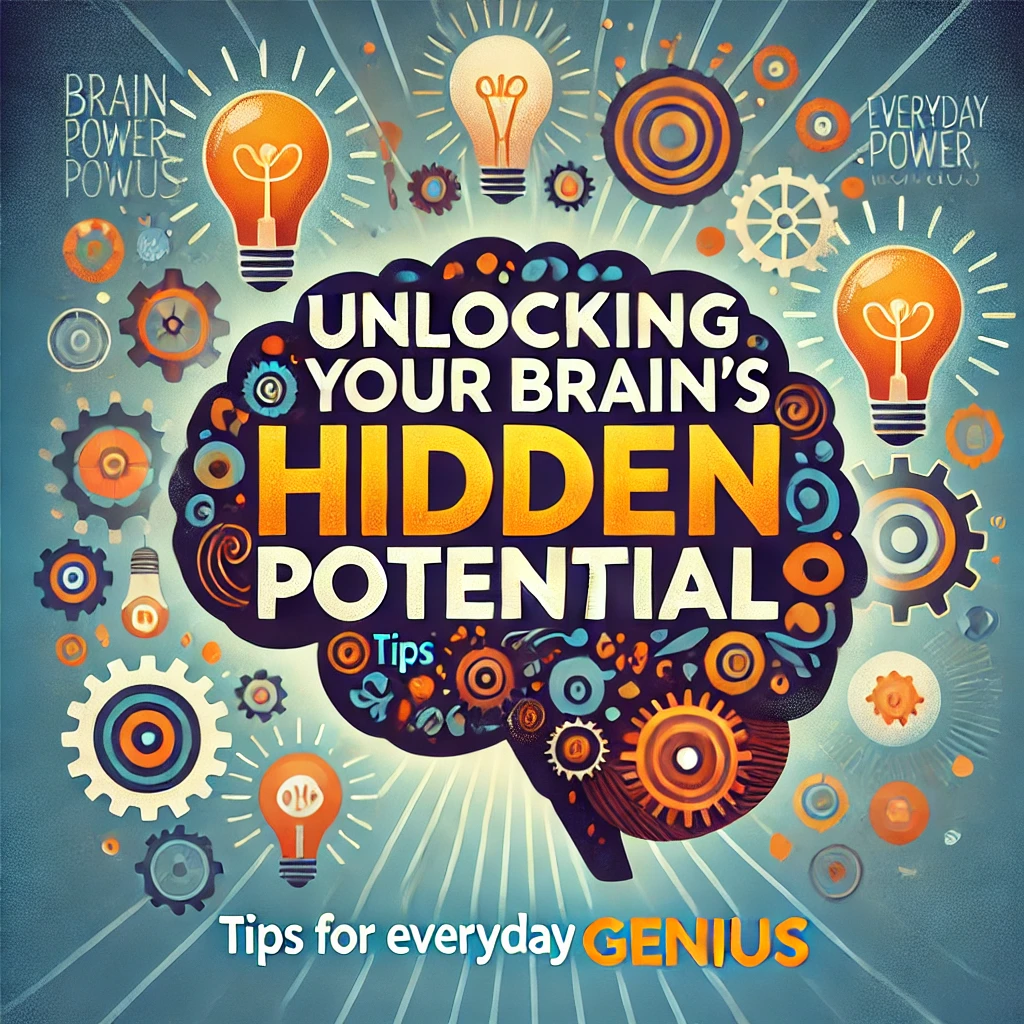Introduction
Ever wonder what it would be like to unlock your brain’s full potential and tackle each day with a sharp, genius-like focus? The good news is that you don’t need to be Einstein to experience this! Every person has untapped cognitive abilities that, with a few strategies, can be harnessed for peak mental performance. In this guide, we’ll explore practical tips for boosting brain power, enhancing cognitive potential, and turning everyday tasks into opportunities for genius thinking.
From brain exercises to improve memory and focus to lifestyle tweaks that support mental clarity, let’s dive into how you can unlock hidden intelligence and use your brain’s full potential.
1. Fuel Your Brain with the Right Nutrition
Your brain is a high-energy organ that requires specific nutrients to function optimally. Proper nutrition plays a foundational role in unlocking brain potential and improving cognitive performance.
Tips for brain-boosting nutrition:
- Eat Omega-3 Rich Foods: Fatty fish, chia seeds, and walnuts contain omega-3s, essential fats that support brain health and memory.
- Incorporate Antioxidants: Blueberries, dark chocolate, and spinach are loaded with antioxidants that protect brain cells from oxidative stress.
- Go for Whole Grains: Whole grains, like oats and quinoa, provide a steady source of energy, keeping you alert and focused throughout the day.
Relatable anecdote:
A few years ago, I swapped out my afternoon sugary snack for a handful of mixed nuts. I noticed I had more sustained energy and less brain fog, which helped me stay focused on my work without that mid-afternoon slump.
Pro tip:
Start your day with a smoothie packed with brain-friendly ingredients like spinach, berries, and chia seeds. It’s an easy, delicious way to fuel your brain for the day ahead.
2. Exercise Regularly to Boost Brain Power
Physical exercise doesn’t just keep your body in shape; it’s also one of the best brain hacks for peak performance. Regular exercise increases blood flow to the brain, supporting mental capabilities and enhancing memory and focus.
Ways exercise benefits the brain:
- Boosts Memory: Physical activity encourages the production of new brain cells, particularly in the hippocampus, which is essential for memory.
- Improves Focus and Clarity: Exercise releases endorphins and reduces stress, making it easier to concentrate and process information.
- Supports Long-Term Brain Health: Regular exercise helps delay age-related cognitive decline, keeping your brain sharp for years to come.
Relatable anecdote:
A friend of mine swears by his morning run. He started jogging daily as a way to unwind but soon realized he could focus better throughout the day, especially when tackling challenging projects.
Pro tip:
Even just 20-30 minutes of aerobic exercise, like brisk walking or biking, can make a noticeable difference in mental clarity and focus.
3. Practice Mindfulness and Meditation
Mindfulness and meditation are powerful tools for increasing mental capabilities and unlocking hidden intelligence. These practices train your brain to stay in the present, reduce distractions, and enhance your ability to process and retain information.
How to incorporate mindfulness:
- Start Small: Begin with 5 minutes of meditation daily and gradually increase as you get comfortable.
- Practice Deep Breathing: Deep, intentional breathing can help calm your mind and reduce stress, allowing for greater mental clarity.
- Engage in Body Scans: Mentally “scan” your body from head to toe, focusing on any tension. This helps you become more aware and grounded, enhancing cognitive focus.
Example:
I started a morning mindfulness practice to reduce stress, but the unexpected benefit was improved focus throughout the day. When challenges arise, I now find it easier to pause, gather my thoughts, and respond with clarity.
Pro tip:
Try a guided meditation app like Headspace or Calm. They offer short, easy-to-follow sessions that are great for beginners.
4. Challenge Your Brain with Puzzles and Games
Brain exercises are fantastic tools for improving memory and focus. Activities that engage your brain, such as puzzles, logic games, and strategy challenges, help strengthen cognitive pathways, increasing both mental flexibility and problem-solving abilities.
Brain-boosting exercises to try:
- Crossword Puzzles and Sudoku: These games enhance problem-solving skills and improve memory.
- Memory Games: Apps or card games that require you to remember sequences or match items can sharpen recall.
- Strategy Games: Chess and similar games encourage long-term thinking and mental discipline.
Relatable anecdote:
I introduced a friend to Sudoku during a vacation. Initially, he found it challenging, but after a few weeks of playing daily, he noticed that his focus improved, and he felt more mentally agile.
Pro tip:
Set aside 10 minutes a day for a brain game or puzzle. Consistency is key to seeing improvements in cognitive function.
5. Harness the Power of Visualization
Visualization isn’t just for athletes; it’s a great tool to help anyone unlock their brain’s potential. Visualizing a successful outcome can boost confidence, reinforce memory, and help organize thoughts more clearly.
How to practice visualization:
- Use Mental Imagery for Memory: When trying to remember something, visualize it in vivid detail.
- Imagine Success: If you have a big project or presentation, visualize yourself completing it successfully.
- Create a “Memory Palace”: Imagine placing things you need to remember (like a list) in specific rooms or spaces in your mind. This technique, known as the Method of Loci, has been used since ancient times.
Example:
I started using visualization techniques when preparing for presentations. By picturing each step clearly in my mind, I found that I was more confident and less reliant on notes, which impressed both my clients and colleagues.
Pro tip:
Practice visualizing your day each morning. Spend a few minutes mentally walking through your schedule and seeing yourself handle each task effectively.
6. Stay Socially Engaged
Staying socially active is an often-overlooked strategy for enhancing cognitive potential. Social interactions stimulate the brain, encouraging clear thinking, empathy, and mental agility. Talking with others about ideas, hearing different viewpoints, and participating in group activities help keep your brain sharp.
Ways to stay socially engaged:
- Join a Club or Group: Whether it’s a book club, sports team, or volunteer group, regular social interactions support cognitive health.
- Have Meaningful Conversations: Engaging in thoughtful conversations helps improve mental clarity and perspective.
- Stay Connected with Family and Friends: Regular contact with loved ones can reduce stress, which in turn supports brain health.
Relatable anecdote:
My father joined a community chess club in his 60s. The weekly gatherings not only helped improve his game but also kept his mind sharp and engaged as he enjoyed learning new strategies from his fellow players.
Pro tip:
Schedule regular catch-ups with friends or join a community activity that interests you. Social interactions are natural brain exercises!
7. Learn Something New
Lifelong learning is a powerful way to keep your mind sharp and boost cognitive function. The process of learning new information and mastering new skills helps create and strengthen neural pathways, increasing brain power.
Ideas for lifelong learning:
- Take an Online Course: Platforms like Coursera and Skillshare offer courses on virtually any topic.
- Learn a New Language: Language learning is one of the best ways to challenge the brain and improve memory.
- Pick Up a New Hobby: Try learning to play an instrument, take up gardening, or explore creative writing.
Relatable anecdote:
I began learning Spanish using a language app. Initially, it was tough, but with daily practice, I noticed my memory improved, and it became easier to retain information for work projects.
Pro tip:
Commit to learning something new each year, even if it’s small. Lifelong learning builds cognitive resilience, keeping your mind sharp over time.
8. Use the Pomodoro Technique for Focus
The Pomodoro Technique is a time management method that breaks work into short intervals with breaks in between. This technique can help improve focus and mental endurance by allowing the brain to recharge periodically.
How to use the Pomodoro Technique:
- Work for 25 Minutes: Set a timer and focus on one task without interruptions.
- Take a 5-Minute Break: Use this time to stretch or breathe deeply.
- Repeat: After four cycles, take a longer break of 15–30 minutes.
Relatable anecdote:
I struggled to stay focused on lengthy tasks until I tried the Pomodoro Technique. Working in 25-minute intervals kept me from getting overwhelmed and helped me accomplish more without burning out.
Pro tip:
Use an app like Focus Booster to easily track your Pomodoro intervals and stay on task.
9. Practice Positive Thinking
Believe it or not, positive thinking can impact brain health. Adopting a positive outlook helps reduce stress, which is beneficial for brain function. Additionally, positivity can encourage resilience, making it easier to bounce back from setbacks and maintain mental clarity.
How to cultivate positive thinking:
- Practice Gratitude: Take a few minutes each day to jot down things you’re thankful for.
- Reframe Challenges as Opportunities: This mindset shift can boost motivation and mental strength.
- Surround Yourself with Positivity: Spend time with people who encourage and inspire you.
Relatable anecdote:
I started keeping a gratitude journal as a simple way to shift my perspective. Over time, I noticed that I felt more
energized and mentally resilient, even during stressful situations.
Pro tip:
Set a reminder to jot down three positive things each day. This simple habit can shift your outlook and reduce stress.
Conclusion
Unlocking your brain’s hidden potential doesn’t require grand gestures. With small, consistent habits—like nourishing your brain with the right foods, engaging in brain exercises, staying socially active, and practicing mindfulness—you can experience everyday genius and boost cognitive performance. From challenging your mind with new activities to learning the Pomodoro Technique for focus, each tip builds a foundation for mental clarity, resilience, and lifelong brain health.
Begin incorporating one or two of these strategies today, and over time, you’ll notice improvements in focus, memory, and mental agility. Remember, everyone has the potential to unlock hidden intelligence. By investing in your brain health now, you’re setting yourself up for a future that’s not only sharp but also fulfilling and inspired.
FAQ Section
1. How can I increase mental capabilities naturally?
Proper nutrition, regular exercise, and lifelong learning are all effective ways to naturally boost mental capabilities.
2. What are some easy brain exercises for beginners?
Start with puzzles, memory games, or strategy games like chess. These activities improve memory and focus.
3. Does learning new things improve brain health?
Yes, lifelong learning strengthens neural pathways, supporting long-term cognitive health.
4. Can social interaction improve cognitive performance?
Yes, regular social engagement stimulates the brain and can improve mental clarity and focus.
5. How does positive thinking impact brain function?
Positive thinking reduces stress, which supports brain health and improves resilience.
6. What foods should I eat for better brain function?
Omega-3 rich foods, antioxidants, and whole grains are great for brain health.
7. How can I improve focus and memory daily?
The Pomodoro Technique, regular brain games, and adequate hydration all help improve focus and memory.
8. How does mindfulness improve brain performance?
Mindfulness reduces distractions and enhances focus, improving cognitive function.
9. What is the best way to start boosting brain power?
Begin by incorporating one or two new habits, like regular exercise or brain-challenging games, and build from there



